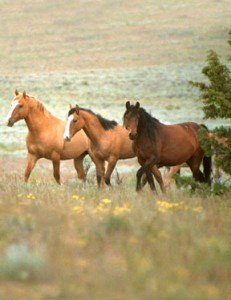Robert Laurence is retired from teaching at the University of Arkansas School of Law and now looks after equally retired horses near Hindsville, Ark.
Last year I stopped by my neighbors' place to see their new foal. They run a small Quarter Horse operation, and I like seeing the newborns. When I asked about the sale prices for horses, I heard this: "Lousy. If PETA hadn't closed down the killer plants, things would be better."
Ah, PETA. With their plastic shoes and video cameras, they are the people we love to hate. Gotta problem? Blame PETA. However, for the record, the Texas horse slaughter plants were closed by the Tarrant County District Attorney, a Republican, enforcing a decades-old law. Attributing the closures to PETA is like attributing the Defense of Marriage Act to the Taliban--sure, they liked the result, but they are hardly the ones who got it done. As long as members of the horse industry delude themselves into thinking that the slaughterhouses were closed by the animal rights movement, they will never understand why the plants closed.
So, who should get the credit--or blame, depending on one's perspective--for the closings? Start with the horse industry itself and its heroic, romantic image of the horse. We do revel in that image, like a mare rolling in a thick patch of clover. (There. I just did it myself.) We sell horses with it. We use it to sell fly masks, tail extenders, and everything in between. We use it to lobby Congress for subsidies and tax breaks. The image is everywhere: Horses as teachers of life's lessons to children; as friends and confidants to "tween" girls; as silent pals to roping boys; as companions into retirement; as gallant warriors and proud athletes. Name another animal that shares Olympic gold with its human.
Hollywood, too, gets some of the credit: Seabiscuit, The Black Stallion, Pilgrim, Soñador, The Pie, Flicka. Sure, the image can be fake; most stallions (and even some mares) are played by geldings. Stallion behavior in reality is R-rated. Sometimes Hollywood plays it straight: When Seabiscuit is sent off to begin his racing career, that’s a foal being separated from his actual mother, and they aren't acting. You might have seen a hundred actual weanings, but the scene is still effective and touching.
Either way, if this romantic image of the horse, and not PETA or another animal rights' organization, is responsible for the closure of the slaughter plants, what’s to be done about it? Maybe a coalition of breed organizations should issue a statement: "Stop all this romantic nonsense about horses. They’re animals. Deal with it." But no, we need the image. Moreover, we believe it … most of us, anyway. Horses are a special kind of livestock, and if somewhere along the line Americans picked up the idea that they shouldn't stand around in feed lots waiting to be slaughtered, we can hardly be surprised, can we?
The industry is discovering that it was one thing to take a neutral position when slaughterhouses were open, but it’s very different to actively advocate for the return of slaughter, in the face of a clientele that is largely repelled by the idea. And the attempt by some pro-slaughter forces to out-PETA PETA, by claiming the slaughter facilities are humane euthanasia centers, is unlikely to work. Without the slaughterhouses, an unwanted horse that was a small asset--the price a killer buyer would pay--becomes a small liability--the price of euthanasia and disposal. Breeders are going to have to leave some mares fallow. "Breed Responsibly" is now as well-meant, and effective, as the "Drink Responsibly" tag line at the bottom of beer ads. But it's a start.
Late in 1999 I was listening to one of those century-in-review shows, and one of the panelists observed, "Who would have thought that after we no longer needed horses to do our work, we'd keep them around just because we like them?" That's it, isn't it? We like them. Simple as that. And that includes people who will never own a horse, nor ever open a magazine like this one. It's that simple fact, not the antics of any animal rights' organization, that stopped the slaughter.
Originally published in the June 2010 issue of The Horse.




Can anyone confirm that these horses were taken out of long term holding in Oklahoma and sold to this killer because, if so, that opens up a whole new can of worms and really gives us ammunition to demand that these long term holding pastures be opened up for inspection by advocates.
If they were sale authority horses “accidentally” sold to a kill buyer, I can see the BLM weaseling out of this.
In the meantime, where are these horses being held?